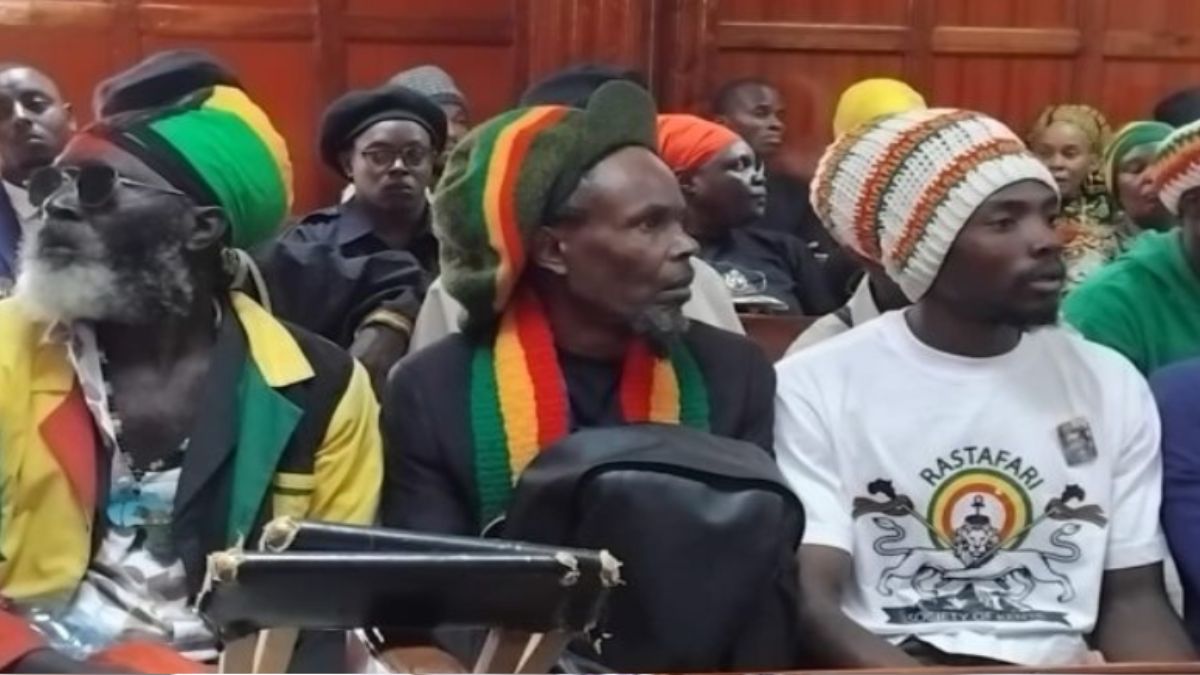When Lilian Wanjiru Kingori boarded a flight from China to Nairobi on October 11, 2022, she carried home more than luggage, she carried the weight of a name about to be stolen and turned into a criminal brand.
A bright Kenyan student studying in China and running a small import business on the side, Lilian was known among her peers for her reliability in currency swaps. She helped fellow Kenyan students exchange Kenyan shillings and Chinese yuan, a simple, transparent arrangement that made her a trusted intermediary.
Until her own name was used to swindle a Chinese national, and the system meant to protect her failed spectacularly.
The Message That Changed Everything
Barely a month after returning home, on November 10, 2022, a stranger reached out on WeChat.
“He added me as a friend and I accepted,” Lilian recalls. “Then he sent screenshots showing he had sent me 16,500 yuan, claiming I hadn’t delivered USDT. I didn’t even know what USDT meant.”
The sender was a Chinese national and the transactions were real, money had indeed hit her WeChat and Alipay accounts. But the person who had initiated those transfers was not Lilian. It was a Kenyan man she knew only as Tyrel, whose M-Pesa account name has been concealed for legal reasons.
She explained the mix-up to the Chinese man, clarifying that she had remitted two of three batches totaling 16,500 yuan and was processing the last. But before she could resolve anything, both her WeChat and Alipay accounts were frozen.
“That was my lifeline,” Lilian says. “I used them to pay suppliers, talk to my teachers, even order stock. My entire livelihood froze in one day.”
From a Currency Swap to a Digital Crime Scene
Desperate, she sought help from friends fluent in Mandarin to recover her accounts. They managed to unlock her Alipay, but her WeChat remained permanently disabled.
To her shock, the same Chinese complainant had also sent her a friend request on Alipay.
“He said my accounts were blocked because of unfinished business with someone called ‘Korkoren,’ who turned out to be Tyrel,” she explains. “He said since Korkoren used my details to receive his money, my accounts had to be blocked.”
When she confronted Tyrel, he denied the claims, saying it was the Chinese man who owed him.
“I told both of them to solve their issues because I wasn’t involved in their trade. I didn’t even know what cryptocurrency or USDT was.”
The DCI’s Slow Dance
Alarmed, Lilian reported the case at Eastleigh North Police Station on October 29, 2022, and was referred to the DCI Headquarters on Kiambu Road, where it was recorded under OB No. DCI/C/GEN/COMP/6/11/2022 .
She cooperated fully, submitting her phone, bank statements and correspondence. Her phone was eventually sent to the DCI Cyber Forensic Lab for extraction in June 2023, but the report only surfaced nearly 18 months later, after pressure and a formal complaint.
“We had to push the officers through their bosses. They had my data all along, but nothing was moving,” she says.
The suspect was reportedly questioned and even refunded part of the stolen money. Yet, to date, Lilian has never been formally cleared. Her digital footprint remains flagged.
“I can’t travel. I can’t trade. Every visa check raises red flags. My name is tainted, as if I’m the criminal,” she says softly.
A Pattern of Silence and Betrayal
Lilian’s story, disturbing as it is, is not isolated.
In early 2025, another Kenyan, whose name we are concealing for safety reasons, shared a strikingly similar experience. We shall refer to him as “Naph.”
Naph, a senior researcher at a global institution, told TV 47 Digital that he was contacted in November 2024 by a Chinese national named Tyre (WeChat ID: Tyrell05), who asked him to help remit payments to a Kenyan academic writer on his behalf.
“He asked for my Alipay Account Code, and I accepted,” Naph explained. “I would receive yuan and send the equivalent in shillings via M-Pesa to a number he provided, +254719***759.”
That number, verified by our investigation, matches the same M-Pesa line tied to one suspect, the very man also implicated in Lilian’s case.
Over several months, Naph helped process what he thought were legitimate transactions. Then, on February 8, 2025, his Alipay account was flagged and disabled.
“At first, I thought it was just security verification,” he says. “But after a month, I called Alipay, and they told me my account was under investigation for multiple fraud cases.”
Upon reviewing the dates and transactions flagged by the Alipay Anti-Fraud Team, Naph realized they perfectly matched the transfers he had made on behalf of Tyre, the same contact who had linked to Ronoh’s number.
The total amount in question? Ksh 199,664.80.
“It’s humiliating,” he says. “I’m a senior scholar and now my account is tainted globally. My money is locked. I can’t support my family. I’m begging the DCI to help track this man and clear my name.”
Our newsroom has seen and verified supporting documents, including WeChat conversations, Alipay transaction receipts, and official correspondence, confirming the credibility of Naph’s account.
A Network of Victims and Official Indifference
Both Lilian and Naph reported the same suspect to law enforcement. Both claim the DCI acknowledged the reports, yet no meaningful action has been taken.
In Lilian’s case, the suspect was allegedly arrested and released on bond, without her or her lawyer being informed. In Naph’s case, there have been no arrests at all.
Two years on, Lilian remains unable to travel, her business frozen. Naph’s professional reputation and finances remain paralyzed.
“Is there a mole inside the DCI?” asks one lawyer familiar with the cases. “Because the pattern is identical, evidence exists, victims cooperate, suspects walk free and innocent people remain criminalized.”
Justice in Reverse
The two cases expose a deeply troubling trend, one where investigative inertia and possible internal collusion shield fraudsters while innocent victims suffer prolonged reputational and financial ruin.
Experts point to a breakdown in coordination between the DCI’s Cybercrime Unit, Interpol and IPOA, which has so far remained silent despite formal complaints.
“If the DCI cannot protect innocent citizens whose only crime is trust, then the rot runs deep,” notes a Nairobi-based digital fraud analyst.
Offences and Penalties Under Kenya’s Cybercrime Laws
Kenya’s Computer Misuse and Cybercrimes Act, 2018, and its 2024 amendment, have sharpened penalties for digital fraud, identity theft and online impersonation, the very offences at the heart of Lilian and Naph’s ordeal.
•Computer Fraud (Section 26), Using a computer system to gain unlawful benefit or cause economic loss carries a fine of up to KSh 20 million or 10 years in prison, or both.
•Identity Theft and Impersonation (2024 Amendment), Offenders face up to KSh 20 million in fines or 10 years’ imprisonment.
•Publishing False Data or Misrepresentation Online, Carries fines of up to KSh 300,000 or 3 years in prison, or both.
•Aiding or Abetting a Cybercrime, Attracts fines of up to KSh 7 million or 4 years in prison.
If the suspect were to be arraigned, he could face any combination of these charges. Given the cross-border element, Chinese victims, Kenyan intermediaries and digital payment systems, prosecutors could also seek aggravated penalties under the amended Act, which allows forfeiture of illicit gains and freezing of implicated accounts.
“The new law is clear and unforgiving,” says a legal analyst. “If the DCI applies it fully, this case could be a landmark in curbing cross-border digital fraud.”
Lilian’s Plea for Redemption
For Lilian, the toll is both emotional and existential.
“I’ve lost my business, my freedom, my peace,” she says. “Every day I wake up wondering if I’ll ever clear my name. I did everything right, reported, cooperated, proved my innocence, but I’m still treated like a suspect.”
Her words echo a broader cry, a plea for accountability from institutions that have traded their duty for silence.
Unless the DCI and IPOA act decisively, more innocent Kenyans risk becoming collateral damage in a system that punishes victims and protects fraudsters.
Names of some victims have been concealed for security reasons. Our newsroom has independently reviewed and verified documentary evidence, including digital transaction logs, police OB numbers and official correspondence, supporting the accounts shared herein.
Repeated requests for comment from the DCI Headquarters and IPOA went unanswered by the time of publication.












